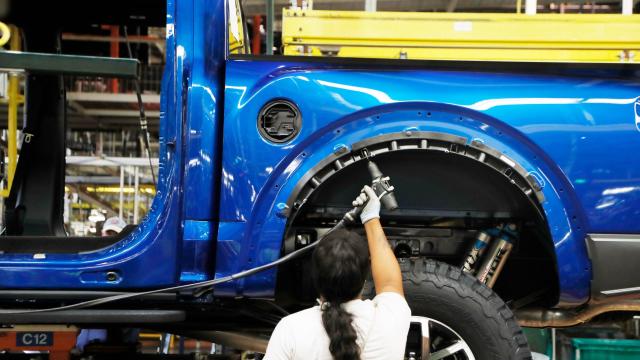Automakers in Europe and the U.S. are gearing up to re-open their plants, even if, without widespread testing, it probably isn’t safe to do so. Still, automakers, who are watching their profits go up in smoke the longer the plants are idled, are determined to reopen, many in the next few weeks, with new procedures they say will help stop the virus’s spread.
Automakers in the United States, including the Big Three, are shooting for an early May restart, a timeline in large part because many states’ stay-at-home orders extend to the end of this month, including Michigan’s. Should those be extended further, restarting could be postponed, but it does seem clear that whenever they do get restarted car manufacturing will be redefined, in the early stages at least.
For the Big Three that means, for now, a negotiation with the union.
Reuters has the latest:
Bernie Ricke, president of United Auto Workers Local 600, which represents workers Ford Motor Co’s Dearborn, Michigan, pickup truck plant and at a number of auto suppliers, said automakers and suppliers have assured him they will allow self-quarantine without sanctions.
“They’ll have a policy that if people aren’t feeling well they should just stay home,” Ricke told Reuters.
[…]
Talks over restarting two Ford plants making SUVs and pickup trucks in Louisville, Kentucky, have included hanging welding curtains between workers who have to work less than six feet (1.83 m) apart and keeping them apart at break times, said Todd Dunn, president of UAW Local 862, which represents more than 12,000 hourly workers at the plants.
One other thing the UAW says it needs? Widespread testing, something experts agree could be one way to return to something resembling normal.
UAW president Rory Gamble wrote on Friday the union has made it clear to the car companies that adequate testing for COVID-19 is key to restarting production and “we must create an environment where workers are comfortable to self-report symptoms and self-quarantine, without penalty.”
Over in Europe, meanwhile, governmental response to the virus has been a bit more organised than in the U.S., especially in Germany, where Volkswagen is based. The Wall Street Journal reported on April 17 how VW says it will restart production there. The answer is a dozens of shifts in how employees interact.
Workers will be asked to take their temperatures from home each morning, change into their factory-floor uniforms before arriving and bring their own lunch. Carpooling is out.
The changes are so extensive that unions say staff will need extra time to familiarise themselves with the new practices. “We have never developed, built or sold cars in these conditions,” Bernd Osterloh, head of Volkswagen’s works council, said in a statement.
Those measures also include a bunch of new ways to work inside the factories themselves, which must be disorienting for auto workers who are used making a car together in fairly close contact:
Volkswagen will institute buffer periods between changing shifts to allow one group of workers to leave before the next shift comes in, to minimise interactions. Workers will enter in a single file, keeping a distance of 6 feet between each other.
Inside the factory, routes have been remapped to add space between workers. Wherever the required 6-foot separation cannot be guaranteed, employees will have to wear face masks. Workers will also no longer pass material or tools by hand. They will need to set things down so others can pick them up at a safe distance.
The efficacy of all of these measures depends on worker cooperation with them and also some underlying assumptions we have about how the virus spreads, which may or may not be correct. Auto manufacturing will go on at some point, of course, the question is how we decide when, and at what cost.
